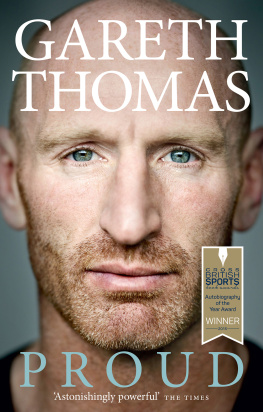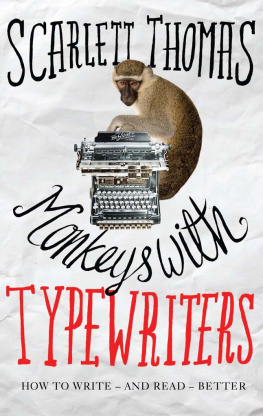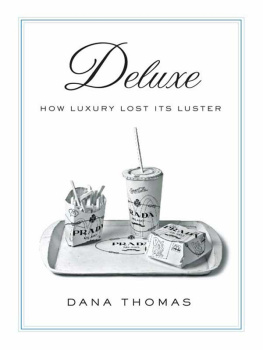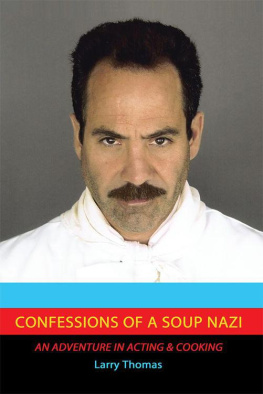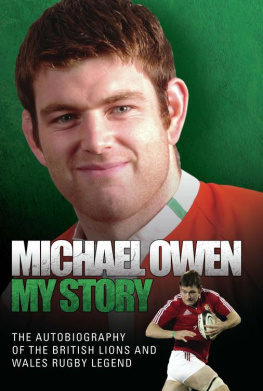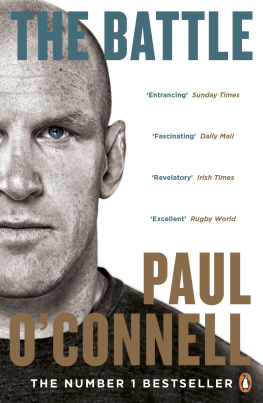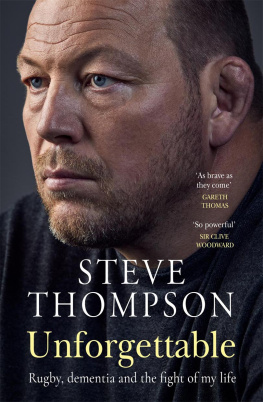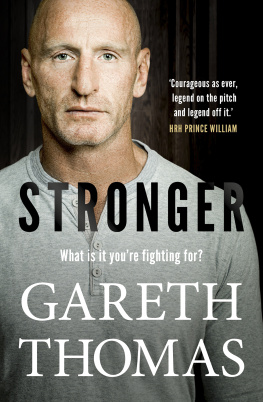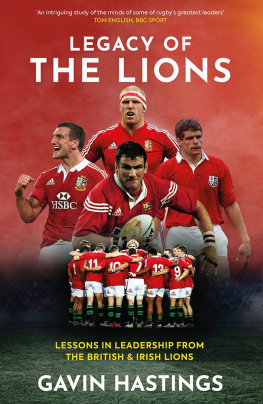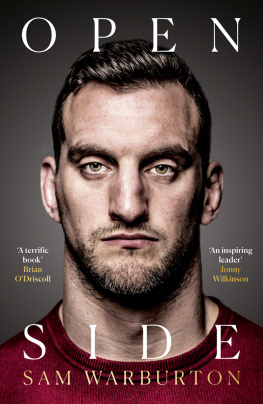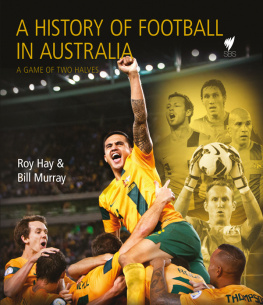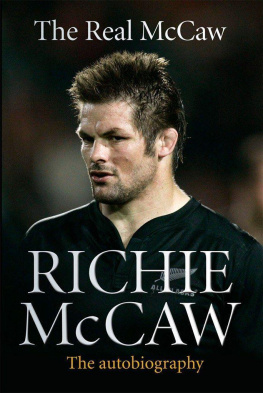CONTENTS
ABOUT THE BOOK
Gareth Thomas had it all. He was a national hero, a sporting icon. He was a leader of men, captain of Wales and the British Lions. To him, rugby was an expression of cultural identity, a sacred code. It was no mere ball game. It gave him everything, except the freedom to be himself.
This is the story of a man with a secret that was slowly killing him. Something that might devastate not only his own life but the lives of his wife, family, friends and teammates. The only place where he could find any refuge from the pain and guilt of the lie he was living was on the pitch, playing the sport he loved. But all his success didnt make the strain of hiding who he really was go away. His fear that telling the truth about his sexuality would lose him everything he loved almost sent him over the edge.
The deceit ended when Gareth became the worlds most prominent athlete to come out as a gay man. His gesture has strengthened strangers, and given him a fresh perspective. Gareths inspiring and moving story transcends the world of sport to tell a universal truth about feeling like an outsider, and facing up to who you really are.
ABOUT THE AUTHORS
Gareth Thomas was born in 1974. He played rugby union for Bridgend, Celtic Warriors, Toulouse and Cardiff Blues, winning 100 international caps for Wales and captaining the British and Irish Lions. In 2010 he switched to rugby league, playing for the Crusaders RL, and for Wales. He retired from rugby in October 2011. Gareth announced publicly in 2009 that he is gay, and was voted the most influentialgay person by Stonewall that year. He is a dedicated supporter of the charity Childline.
Michael Calvin has twice been named Sports Reporter of the Year. He is currently chief sports writer with the Independent on Sunday. His book Family: Life, Death and Football, was shortlisted in the 2011 Sports Book Awards. His last book, The Nowhere Men, was voted Sports Book of the Year 2014 at the British Sports Book Awards.

This ebook is copyright material and must not be copied, reproduced, transferred, distributed, leased, licensed or publicly performed or used in any way except as specifically permitted in writing by the publishers, as allowed under the terms and conditions under which it was purchased or as strictly permitted by applicable copyright law. Any unauthorized distribution or use of this text may be a direct infringement of the authors and publishers rights and those responsible may be liable in law accordingly.
Version 1.0
Epub ISBN 9781473502208
www.randomhouse.co.uk
1 3 5 7 9 10 8 6 4 2
Published in 2014 by Ebury Press, an imprint of Ebury Publishing
A Random House Group company
Copyright Gareth Thomas and Michael Calvin
Gareth Thomas and Michael Calvin assert their right to be identified as the authors of this Work in accordance with the Copyright, Designs and Patents Act 1988
All rights reserved. No part of this publication may be reproduced, stored in a retrieval system, or transmitted in any form or by any means, electronic, mechanical, photocopying, recording or otherwise, without the prior permission of the copyright owner
The Random House Group Limited Reg. No. 954009
Addresses for companies within the Random House Group can be found at www.randomhouse.co.uk
A CIP catalogue record for this book is available from the British Library
ISBN 9780091958336 (hardback)
ISBN 9780091958404 (trade paperback)
To buy books by your favourite authors and register for offers visit
www.randomhouse.co.uk
Chapter One
THE SCENT OF A WOMAN
I wanted to be a beautiful corpse. My eyes were red-rimmed, milky and stagnant. They stared accusingly from the mirror as I bathed them with cold water, forcing me to focus on the image of someone I had come to despise. He was weak, deceitful and dangerous. The least he could do for those whose love he had betrayed was to have a decent death.
It was an automatic, numbing process. I moved from the bathroom, into the bedroom. The airy aroma of a fresh white shirt was faintly repellent, because I felt unclean. I chose a dark tie, tightened in a Windsor knot, to wear with one of the well-cut grey suits the Welsh Rugby Union issues to all internationals. A pair of black, patent leather lace-up shoes completed the mask of normality.
I walked around the bungalow I shared with my wife, Jemma, in a quiet cul-de-sac on the outskirts of Toulouse, where I played for one of the great clubs in world rugby. I opened the shutters, and the late-autumn sun flooded in through picture windows. It was one of those crisp, cloudless days on which running around the paddock was a reaffirmation of faith.
The house had Jemmas imprint all over it: she was such a good nest-maker it had no stamp of my personality on it. She had arranged the furniture, selected the fabrics, and ensured there were always fresh flowers on the table. Things had seemed to happen magically: the kitchen was always spotless, the beds always made, and the clothes in the right place. She did everything my mother would do, everything a home-maker does.
But she had gone. She couldnt bear to live my lie any longer.
I had made my confession to her three months previously, in our house in the village of St Brides Major, in the Vale of Glamorgan. Yet we had decided to return to France to work at our marriage in the vague, romantic belief that somehow things could change. All we really had was each other, and we had conspired in the belief that our daydream would be enough.
Everything fell apart when I returned from training to the empty house. I knew, instinctively, that things would never be the same again. I rang her repeatedly, but couldnt get an answer. A better husband would have called her friends, or the police; he would have leapt to the panic-stricken conclusion that she had been run down by a careless driver while out shopping. But, instead of fearing the worst and heading to the local accident and emergency department, I sat there, in oppressive silence.
Her departure was hardly a surprise, and it forced me to confront what I had become. Deep down, I knew I had not been man enough to ask myself two hard questions, with two simple answers: Why are you doing this? Who benefits when you pretend that life is a fairytale you or Jemma?
In answer to the last, I did in the short term, at least. The pretence of a normal marriage kept my secret safe. Jemma was getting nothing out of the arrangement. I was being hideously unfair, terribly selfish, yet, at the moment of crisis, I was consumed by self-pity: Shit. People are going to know somethings wrong now. Everything I have hidden so well for so long is going to be discovered. For the first time in my life, Im on my own.
I knew I would have to carry on playing and training. I knew the phone calls would come, and that Jemmas return to Wales would set tongues wagging. So I acted entirely in character, and lied through my teeth: I called my mother, Yvonne, and told her Jemma had walked out because she had discovered me cheating with another woman. I repeated the story to Ian Compo Greenslade, my best friend and best man.
It is only now, when I recall the tone of their voices and the eloquence of their silence, that I understand what they were thinking, what they were too kind, loyal and loving to tell me: Come on, Alfie. You cant keep this going much longer.
I was in too deep. I felt I had no option but to retreat into my delusional world, where I kidded myself that I was able to fool all of the people, all of the time.
Next page
